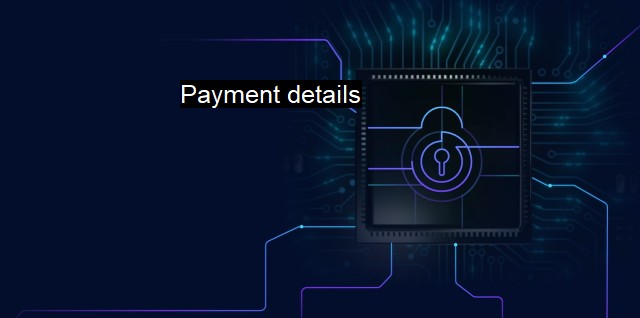What are Payment details?
The Importance of Protecting Payment Details with Antivirus Software: A Cybersecurity Perspective
Payment details refer to the personal and sensitive information provided during financial transactions conducted digitally or electronically. This can include information like bank account numbers, credit or debit card numbers, expiry dates, security codes (CVV), and even personal identification numbers (PIN).In contexts related to cybersecurity and antivirus software, the term "payment details" gains even more significance. As more banking and money transactions are moved online, consumers’ payment details often become sensitive data that malicious actors may attempt to steal. They employ various cybercrime methodologies that pose significant challenges to data security, leading to monetary loss and identity theft.
One commonly employed tactic by cybercriminals to unlawfully obtain payment details is phishing. They trick the users into sharing their payment details either by posing as legitimate entities via emails, text messages, or by creating fake websites resembling trusted financial institutions, thereby capturing payment details directly.
Malware, another serious threat, is malicious software infiltrated into computers and networks at the user’s end, without their knowledge or consent, with the intent of providing access to or stealing sensitive data, payment details being the primary target. This can occur via seemingly inconspicuous methods such as downloading an infected file or clicking on a malicious link.
Ransomware, a subtype of malware usually disguised as a legit software, serves to gain unauthorized access to a user's system. Once the ransomware infects a device or a network, it encrypts the user’s data, followed by demands of extortionate money transfers to decrypt the locked data, once again putting payment details at risk.
Apart from these, keyloggers and spyware are other forms of threats used to steal payment details. Keyloggers record keystrokes made on a computer, capturing sensitive data like usernames, passwords, and payment details. Spyware is covertly installed into systems and used to collect detailed information about an individual or organization without their knowledge.
The bombardment of such threats reaffirms the need for robust cybersecurity solutions. Antivirus software is an essential tool to ward off such cyber threats and secure payment details. It scans your device and files for any suspicious or known malicious items and eradicates those threats. Some antivirus software are adept at identifying and blocking phishing websites, warning users before they unknowingly subject their payment information to threat actors.
a commendable antivirus program has a firewall which monitors and regulates the internet traffic of your device, preventing online fraud attempts by stopping unauthorized access to sensitive information. Similarly, advanced antivirus technology can provide real-time protection against ransomware, preventing unauthorized encryption of data.
Another critical feature of these sophisticated cybersecurity instruments is shielding payment details during online transactions using encryption. All entered details are encrypted before sending them to the servers, so even if the data transmission is intercepted, the attacker would not decipher the information.
Antivirus software also frequently updates its virus definitions to guard the systems against all the recent, and evolved threats, ensuring that payment details and other sensitive data are not compromised.
‘payment details’ signify the crucial data shared during financial transactions, often making it a lucrative target for cybercriminals. The landscapes of modern cybersecurity threats require robust and sophisticated antivirus software to counter these challenges to safeguard payment details. The technologies exist, but a crucial part of such a strategy is the education of users in recognizing potential threats and understanding the crucial aspect of maintaining and updating their cybersecurity tools.

Payment details FAQs
What payment methods are accepted for cybersecurity and antivirus software purchases?
We accept various payment methods such as credit cards, debit cards, PayPal, and bank transfers.Is it safe to provide my credit card information for payment of cybersecurity and antivirus software?
Yes, we use industry-standard encryption and security protocols to keep your payment information safe and secure. Your information is never shared with any third parties.What happens if there is an issue with my payment for the cybersecurity and antivirus software?
If there is an issue with your payment, our customer service team will work with you to resolve the issue and ensure that your purchase is processed successfully.Do I need to provide any personal information other than payment details when purchasing cybersecurity and antivirus software?
We may ask for some basic personal information such as your name, email address, and shipping address to process your purchase. However, we do not collect or store any sensitive personal information such as social security numbers or banking information.| | A | | | B | | | C | | | D | | | E | | | F | | | G | | | H | | | I | | | J | | | K | | | L | | | M | |
| | N | | | O | | | P | | | Q | | | R | | | S | | | T | | | U | | | V | | | W | | | X | | | Y | | | Z | |
| | 1 | | | 2 | | | 3 | | | 4 | | | 7 | | | 8 | | |||||||